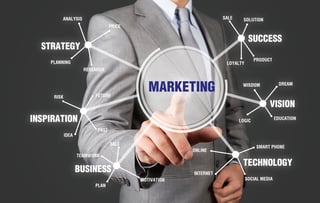How do politicians get us so stirred up?
The presidential election of 2016 is one of the most unexpected, heated, and distinct elections that America has ever seen. The two individual presidential candidates affect voters in very different psychological ways, swaying them with common marketing and advertising practices brands should also be taking advantage of.
 In reality, politics is all about marketing. Each presidential candidate is marketing themselves to their desired voter population, and touching on all of their weaknesses to get as many supporters as possible.
In reality, politics is all about marketing. Each presidential candidate is marketing themselves to their desired voter population, and touching on all of their weaknesses to get as many supporters as possible.
One difference and advantage, between brand and political marketing, is that with politics, there are actual voting and concrete results. Election polls frequently update data that give campaign managers, or campaign marketers, quick and pertinent feedback on the effects of their efforts.
Below is a list of a few psychological marketing lessons that political marketers use that can also benefit brands.
The Consistency Principle
This election is unique in more ways than one, but political watchers have noticed that this year, in particular, the views of voters are not changing nearly as much as they have in past elections. In this election, most voters identify more with one candidate or party and plan to stick with that decision until they vote.
The main reason for this phenomenon, this year and in the last few elections, is the rise of social media and technology as a whole. Once again, just like brand marketing, social media affects voting habits as well.
"The consistency principle" argues that the human brain will actually "rewire" itself to align our behavior with public statements made by us, or our loved ones, online. Public forums like social media pages usually consist of friends and family members, those in which we love and cherish the most. This usually means that commentary from them on social media has the powerful effect to sway decisions.
The more a person expresses themselves by writing a comment, sharing a video, or liking a post the more you psychologically commit to a position.
Confirmation Bias
Most people crave validation, and that does not change when it comes to their political opinions. When someone has made a decision about which candidate or party he or she are going to support, he or she self-reinforce that decision by aligning themselves with people that support his or her decision and information that confirms what he or she believe.
This phenomenon is known as the "confirmation bias." Social media and the digital age makes this easier because every opinion has a corresponding website, message board and social media group to reinforce that belief. While at the same time, actively avoiding and ignoring any information that conflicts with that particular viewpoint.
Non-Rational Appeal
It is possible to change someone's already formed opinion; however, it is harder to do it rationally (with the presentation of facts). More efficient strategies appeal to automated, non-rational emotions.
 Emotional-appeal strategies are stronger and more capable, for example, some people base their decisions off of other individuals who seem to be similar to themselves.
Emotional-appeal strategies are stronger and more capable, for example, some people base their decisions off of other individuals who seem to be similar to themselves.
This can be a strong influence on changing opinions. People have a tendency to flock to a candidate (or brand) that is more popular because that is the candidate the majority of people are apparently favoring.
Another example is the "authority principle." This theory states that marketers gain support and endorsements from people of influence, like respected politicians, or celebrities. This is because people respect their opinions and accept unmerited guidance from them.
Decision-making does not work like most people think it does. There is no real difference between how individuals make political decisions versus purchase decisions. As a result, psychology-driven marketing is just as critical in politics as it is in advertising products and services.
If you are now convinced that psychology driven marketing and advertising works, with the help of social media websites and the rise of technology, our professional marketers at Donovan Digital Solutions can help you successfully market your brand. Contact us today for a Free Consultation.





